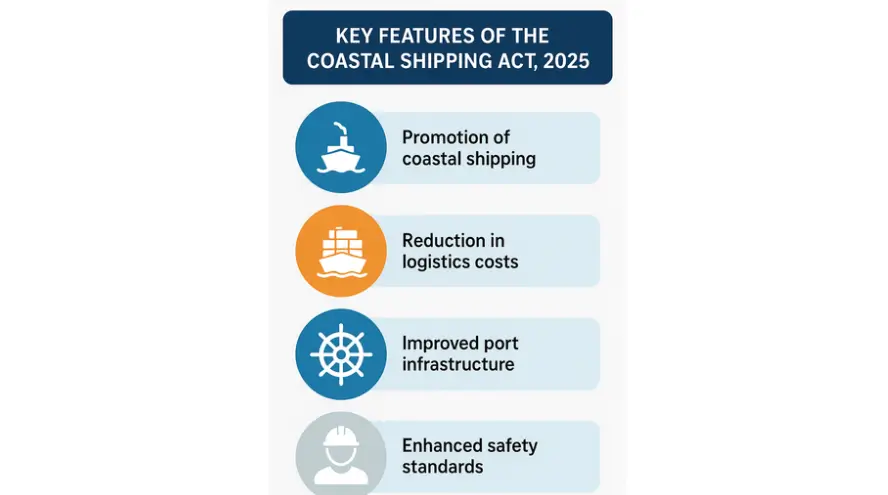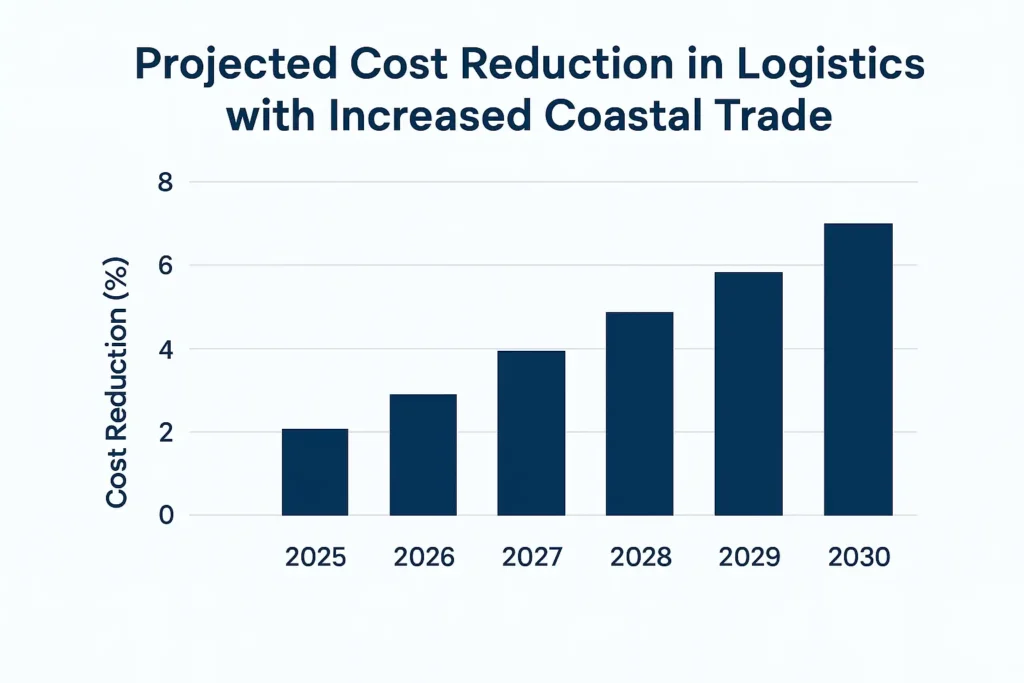Introduction
India’s coastline spans over 7,500 km, making coastal shipping a critical component of domestic trade and maritime security. With the introduction of the Coastal Shipping Act, 2025, the government aims to strengthen national security, streamline licensing, encourage domestic participation, and modernize the coastal fleet.

This legislation replaces outdated provisions of the Merchant Shipping Act, 1958 and creates a National Coastal and Inland Shipping Strategic Plan to ensure India’s maritime sector remains competitive.
Key Objectives of the Coastal Shipping Act 2025
- Promote Indian ownership and operation of vessels for national security.
- Simplify licensing procedures for coasting trade and chartered vessels.
- Ensure compliance with maritime safety, security, and environmental standards.
- Develop a National Database of Coastal Shipping for transparency and policy planning.
(For guidance on maritime compliance, visit Indosearch.)

Major Provisions at a Glance
| Provision | Details |
|---|---|
| Licensing | All non-Indian vessels need a license from the Director-General of Shipping to engage in coasting trade. |
| Strategic Plan | A National Coastal and Inland Shipping Strategic Plan updated every two years to assess routes, efficiency, and integration with inland waterways. |
| National Database | Monthly updated portal containing data on licenses, routes, and compliance. |
| Offences & Penalties | Strict fines, vessel detention, and imprisonment for violations (up to ₹15 lakh fine or six months imprisonment). |
| Exemptions | Central Government may exempt certain vessels or trades in public interest. |
| Repeal | Part XIV of the Merchant Shipping Act, 1958 stands repealed. |
How Will It Benefit India’s Maritime Sector?
- Boost for Domestic Shipowners
- By prioritizing Indian-owned and operated vessels, the Act encourages investment in indigenous shipbuilding and operations.
- This aligns with the Atmanirbhar Bharat vision and supports maritime startups and entrepreneurs.
(For maritime consultancy services, explore Indosearch Maritime Solutions.)
- Improved Compliance & Safety
- Mandatory reporting of voyage details to the Director-General of Shipping ensures better monitoring of trade routes and maritime safety.
- Compliance with security directives strengthens India’s coastal defence readiness.
(For information on maritime medical certification, see Indosearch Doctors.)
- Integration with Inland Waterways
- The Act supports synergy between coastal shipping and inland waterways, reducing logistics costs and congestion on highways.
- This offers a cleaner, greener alternative for domestic transport.
- Transparent Licensing Process
- The National Database of Coastal Shipping makes data on routes, licenses, and vessel status publicly accessible, curbing malpractices.
(To understand recruitment licensing norms, visit Indosearch RPSL Guide.)
- The National Database of Coastal Shipping makes data on routes, licenses, and vessel status publicly accessible, curbing malpractices.
- Support for Authorized Recruitment Agencies
- Indian vessels operating under this framework will increasingly rely on DG Shipping-approved recruitment agencies.
(Learn about approved agencies in the Indosearch RA Section.)
- Indian vessels operating under this framework will increasingly rely on DG Shipping-approved recruitment agencies.

Challenges and Critical Considerations
- Implementation Capacity: The Directorate General of Shipping must ensure timely license processing and database updates.
- Awareness Among Operators: Smaller vessel owners may lack clarity on new requirements.
- Infrastructure Development: Ports and coastal facilities need upgrades to handle increased vessel traffic.
- Balancing Domestic Protection vs. Global Trade: While prioritizing Indian vessels promotes domestic shipping, care must be taken to avoid trade bottlenecks.
